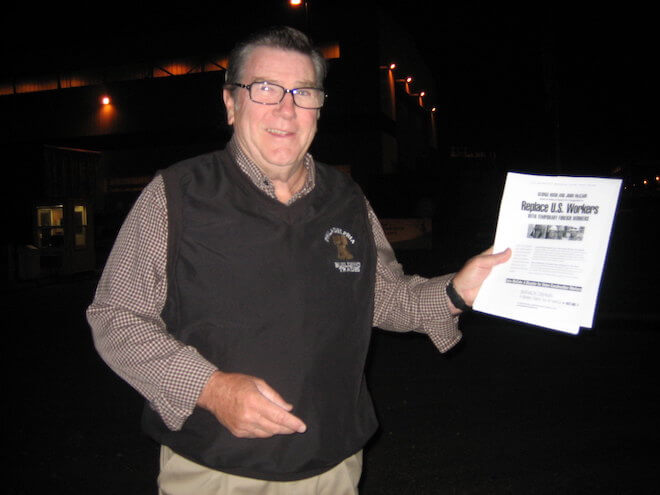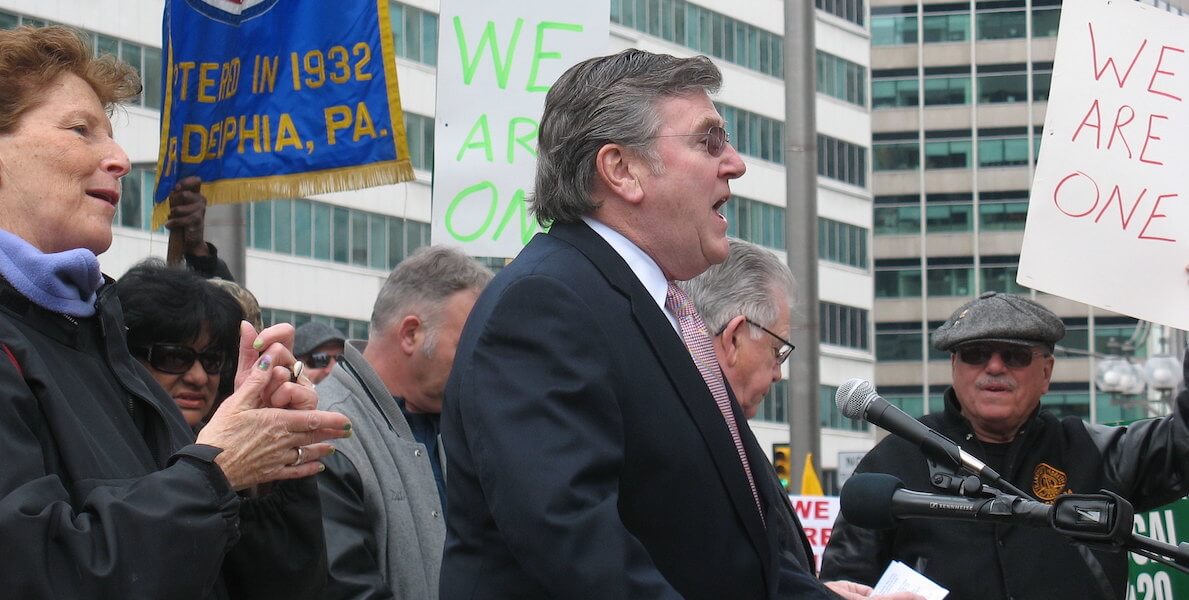Patrick B. Gillespie, who led the Greater Philadelphia Building Trades for 33 years, will be remembered for helping to bring billions of dollars and thousands of jobs to our city and region. He should also be remembered for bold and courageous leadership that is too little evident in our politics today. A contrarian by nature, Pat was also a contrarian by calculation when regional growth was at stake. Pat died August 29; he was 76.
I met Pat in the post-Watergate year of 1975, when he was elected to the Pennsylvania House of Representatives as a Democrat from heavily Republican Delaware County. Overcoming resistance from two powerful Philadelphia Democrats, House Speaker Herbert Fineman (my boss at the time) and Mayor Frank Rizzo, Pat and four fellow Delco Democrats negotiated a cap on the city’s non-resident wage tax that has survived in state law for more than 45 years.
It was good politics and policy but not enough to save Pat when Republicans reasserted dominance of the county delegation in 1976. Pat returned home to a different kind of heavy lifting, as a member of Operating Engineers Local 542 and ultimately as a leader of the regional council that represents 50 unions.
During the epic, two-year battle to secure $185 million in state funding to build a new convention center and save the city’s dying hotel and tourism industry, Pat and his close friend Fred DiBona, president of the Greater Philadelphia Regional Chamber of Commerce, were an effective one-two lobbying punch for a city regarded by many upstate legislators as a black hole of corruption and waste.
In early 2002, when many Democratic insiders doubted that a former Philadelphia mayor could win a statewide election, Pat supported Edward G. Rendell over his fellow Irish Catholic, State Treasurer Bob Casey, with a simple explanation: “Ed Rendell is ready to be governor.”
Recognizing that even the city was worried about controlling the center’s half-billion dollar construction cost, Pat agreed to an unprecedented exemption of the project from Pennsylvania’s so-called “four-part-bidding” law, which has been strongly supported for decades by organized labor. Enacted in 1913, the law requires public agencies to let separate contracts for plumbing, heating, ventilation and electrical work, shielding contractors and their craft unions from bidding competition and efficient management by a general contractor.
With Pat’s support, the exemption became a standard feature of huge public investments that followed: three new stadiums, a revitalized shipyard, convention center expansion, and others totaling more than $1 billion in state funds and billions more in city, federal, and private funds, all creating thousands of permanent jobs, many for minorities. Hard-headed and hard-hatted Pat knew that in Philadelphia, large projects would be built with union labor.
The exemptions were consistent with Pat’s belief that unions perform better when management is not only fair but strong. As a board member and critic of the Pennsylvania Convention Center Authority, he pushed for the engagement of a professional arena management company to deal with the center’s six unions and to repair its reputation among exhibitors for offensive behavior and excessive costs. He also supported hospitality training for craft unions whose construction site ethos was not suited for winning back customers who could go elsewhere. More broadly, he supported drug and alcohol programs to help union members hold onto their jobs and to hold their families together.
Pat knew that the trades’ historic underrepresentation of minority workers made his job harder. He readily agreed to aggressive minority hiring goals imposed by the city on the huge projects his council had supported, and the goals were met but proved transient. Pat ran a council, not the unions themselves.
It wasn’t just building new city projects that motivated Pat, whose leadership responsibilities and political reach were regional. Over three decades, he supported three successful campaigns to secure dedicated funding for SEPTA, staving off cuts to city and suburban transit. When the Schuylkill and Delaware River refineries abruptly threatened to close, he energized an impressive bipartisan coalition that stretched from Washington, D.C. to Harrisburg to City Hall and the Delco courthouse. The coalition of public and private sector leaders saved thousands of jobs and dozens of businesses in small river towns from devastation and the regional economy from significant damage.
Pat’s style was inimitable; his boldness, courage, and commitment to encompassing growth over parochial gains should be models for our next generation of leaders. We need more such contrarians.
Pat could also be a contrarian in elective politics. In early 2002, when many Democratic insiders doubted that a former Philadelphia mayor could win a statewide election, Pat supported Edward G. Rendell over his fellow Irish Catholic, State Treasurer Bob Casey, with a simple explanation: “Ed Rendell is ready to be governor.” In 2008, when Governor Rendell and most of the state’s Democratic leaders supported the heavily favored Hilary Clinton in the Pennsylvania presidential primary, Pat persuaded his overwhelmingly White council members to endorse Barack Obama.
Pat was a blunt, and at times outrageous, negotiator, but beneath his rough language I heard a hint of Irish blarney, and later heard his unabashed laughter at his own antics. Pat’s style was inimitable; his boldness, courage, and commitment to encompassing growth over parochial gains should be models for our next generation of leaders. We need more such contrarians.
The two charities Pat’s family selected to remember his loss are revealing: Fred’s Footsteps, a foundation Pat helped establish to honor his deceased convention center warrior sidekick Fred DiBona, which helps working families deal with financial hardships due to a child’s illness or injury; and Rock Ministries, a free gym in Kensington established by Buddy Osborn, a born-again ex-boxer, ex-tradesman, and ex-felon, which has taught thousands of mostly African American kids from drug and crime-ridden streets to box and also taught them spiritual values to help them grow into responsible and caring adults.
Both worthy causes. In memory of Patrick B. Gillespie, who pushed the trades to open their ranks to more minority members, I gave to the Rock.

Joseph McLaughlin is a retired Temple University professor, city and state official, and lobbyist. He helped secure city and state votes for many of the projects supported by the City of Philadelphia and by Pat Gillespie and the building trades.



